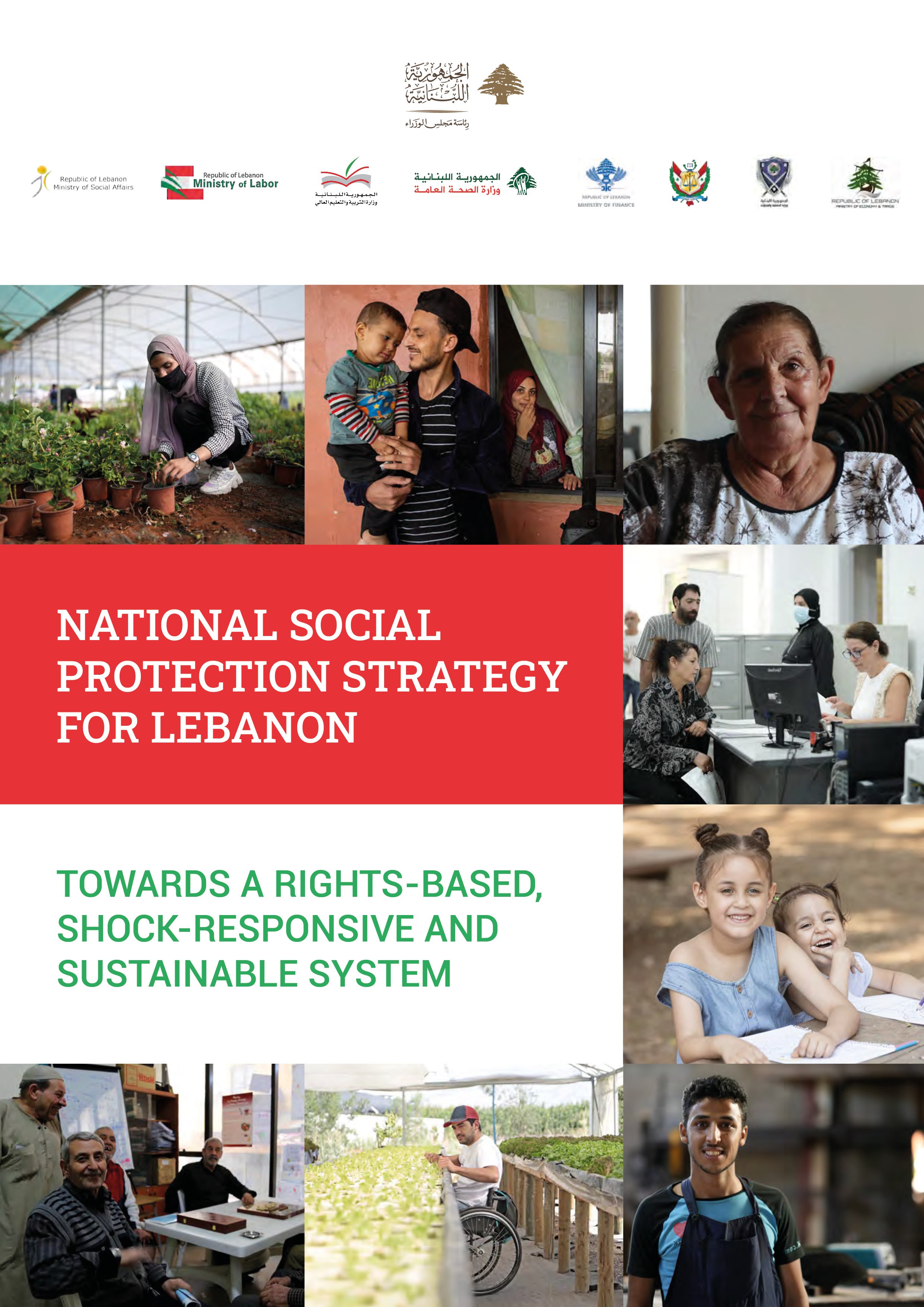National Social Protection Strategy for Lebanon
2024
National Social Protection Strategy for Lebanon
Toward a Rights-Based Shock-Responsive & Sustainable System
The National Social Protection Strategy for Lebanon represents the first committed attempt to carrying out social reforms into a concrete, integrated and cross-sectoral approach, in order to change the dynamic of providing social protection services from fragmented silos to a nationally coordinated and inclusive system. In fact, the absence of a comprehensive universal social protection system has undermined the socio-economic rights, contributed to widening inequalities, and limited the potential for inclusive human-centered growth and development. Thus, designing a vision for social protection is a pivotal prerequisite for the country’s recovery from the multi-layered crises it has experienced, as there is an urgent need to address matters of social justice which have been systematically neglected in the post-war era.
In January 2019, the Ministry of Social Affairs (Facilitated by Beyond Group in partnership with UNICEF and ILO) convened stakeholders from government, development partners, civil society, and academia, to initiate Lebanon’s first national dialogue on social protection and lay the intellectual groundwork for a participatory policy process that sought to define the contextual vision for social protection in Lebanon, outline the key priorities for the country, and design a comprehensive system accordingly.
A consultative process of collecting data, mapping the institutions, programs and instruments of the social protection sector was initiated by the government of Lebanon, led by the Inter-ministerial Committee on Social Policy, coordinated by the Ministry of Social Affairs, and facilitated by Beyond Group with the technical support of UNICEF and ILO and funding from the European Union and the Government of the Netherlands. It included 14 governmental agencies and 103 non-governmental stakeholders, with wide engagement from development partners, civil society actors, and academia.
Here it is worth noting that the process has been dynamic and progressively adapted in light of rapidly changing socio-economic and political dynamics of the country, with the resignation of two cabinets, ongoing mass protests, an economic and financial crisis, the COVID-19 pandemic, and the Beirut Port Blast.
This document was reviewed by the Ministerial and Technical Committee in accordance with Council of Ministers Decision No. 69/2022., which defined the vision and strategic objectives and the scope of this strategy’s coverage to Lebanese citizens and assigned all matters related to refugees and displaced persons to the international community in cooperation with the Lebanese state and in line with international obligations, provided that these programs adhere to the Lebanese constitution and comply with all decisions made by previous and present governments. A dedicated appendix is created for this purpose.
Based on an extensive situational analysis of the social protection sector, and following substantive consensus-building efforts throughout these turbulent times, there has been wide agreement that the Strategy must achieve three core features of:
Universality as part of a human rights-based approach to social protection.
Shock-responsiveness to improve the government’s margin of capacity to respond to current and emerging crises.
Financial sustainability to ensure continuity and anchor all initiatives in feasible implementation measures.
Moreover, four strategic goals were established for the Social Protection Strategy:
Strategic Goal 1: Coverage
Working to gradually expand covrage and benefits of social protection programs for the Lebanese population in an effort to achieve universal and adequate coverage for all, in a manner consistent with the state’s financial capabilities and with a plan for financial sustainability.
Strategic Goal 2: Governance and Institutional Capacity
Developing the capabilities of institutions responsible for social protection within the Lebanese state and the governance system in a way which enables the state to implement the strategy effectively.
Strategic Goal 3: Funding
Develop and ensure feasible, fair and sustainable financing mechanisms for social protection to ensure the gradual implementation of the strategy, taking into account the overall financial situation of the country.
Strategic Goal 4: Accountability and Transparency
Developing information systems within the relevant institutions and unifying them to facilitate access to information related to social protection programs, and establishing a clear structure within the Lebanese Government for accounting and oversight, along with ensuring data privacy.
Based on a hybrid methodology, policy outcomes and priority initiatives were developed using two lenses:
A pillar approach which looks at the social protection system constituting five agreed pillars, which are
Social Assistance
Social Insurance
Social Welfare
Financial Access to Basic Services
Economic Inclusion and Labor Activation
A lifecycle approach which takes a people-centered look at the social protection system and its ability to address contingencies faced throughout the human lifecycle during childhood, working age, and old age. Across all priority interventions which have been developed considering these two lenses, the overarching reforms to the social protection system include:
A robust legal and policy framework
Integrated contributory and non-contributory social protection schemes
Measures for integration and coordination across programs
Developed governance, institutional capacity, and administrative infrastructure of governmental entities
A mixed financing model that combines budget resources and contribution financing for social protection
Moreover, each pillar of the Social Protection Strategy identifies policy outcomes, strategic orientations, initiatives, and a roadmap over the short, medium, and long term. Thus, the current context presents an opportunity to bring together all stakeholders and promote inter-sectoral coordination under the umbrella of the Social Protection Strategy, which not only outlines a vision for change in the social protection sector in Lebanon, but also represents a roadmap of specific, phased actions for its implementation.

